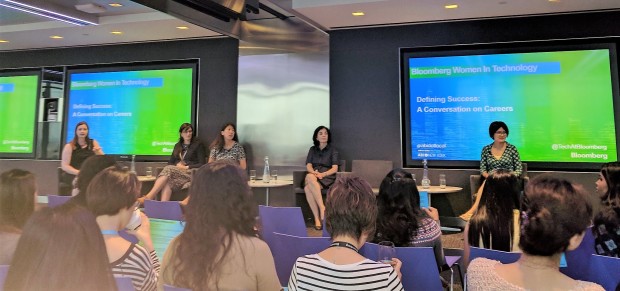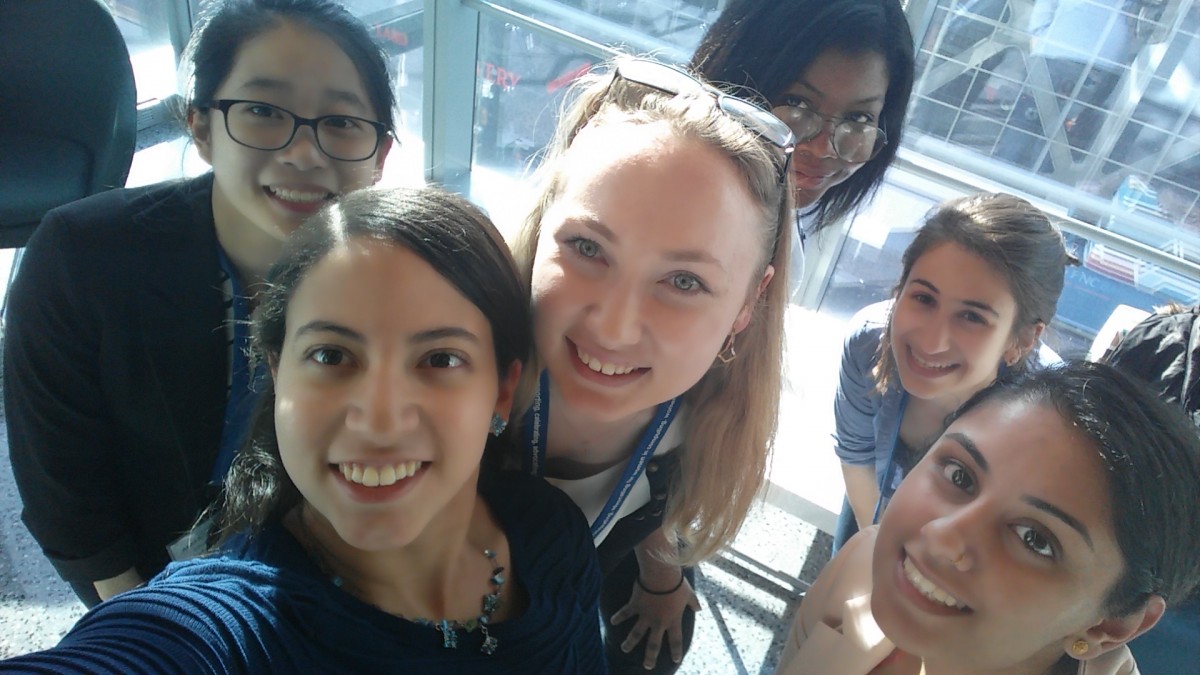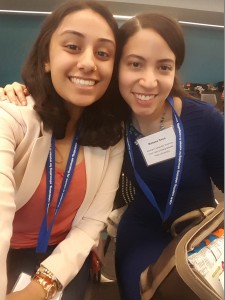by Kaitlyn Bestenheider
On Thursday, September 15th, Seidenberg graduate student, Kaitlyn Bestenheider (M.S. Information Systems), attended the latest Professional Women’s Series Panel on “Defining Success: A Conversation on Career” hosted by Bloomberg Women in Technology (BWIT) and Anita Borg Institute (ABI.NYC).
The discussion started with Esther Kundin, Software Architect & Infrastructure Engineer in Big Data at Bloomberg, discussing how, “In school, you work hard, do good, and get A’s. Then you move on… When you start your career, things don’t always work that way. You have to learn to tell people what you are doing. You have to be seen as both technical and professional.”
Later during the Q&A, she continued, “In school, when you are given a homework assignment or problem, it’s a closed assignment. The solution has already been found. You are also finding it. In the real world, the solution has not been found. There’s no right or wrong way. It becomes a question of, ‘Can you get it done efficiently and effectively?’ …and it’s all very collaborative. A group project in school is not the same. In school, it’s a small project. In the real world, it’s an open-ended project with a lot of people and personalities working on projects that are sometimes neighing on impossible, but you make it happen.”
Other fantastic advice was given by Danielle Lahmani, Global Head of Engineering Training & Documentation at Bloomberg. “If you are able to get a mentor very early on, that’s going to be incredibly helpful in navigating the network that you are in.” She went on to discuss how “Cinderella Syndrome, where you just put your head down and just work” simply doesn’t work in this industry. You have to “build technical depth and presentation.”
Pinky Dewani, Head of Engineering for Bloomberg Indices added her take on how to be successful early in your career, “Translate technical ideas and design and implementation ideas depending on the audience you’re working with,” meaning to be able to explain things to everyone from your very technical team to the investor or even end-user who might not understand technology at all. The ability to understand it well enough to break it down for anyone will make you a valuable asset to any team.
On the topic of navigating the gaps for getting women in to midlevel management, Kundin suggests working on smaller projects for the first few years, but becoming the go-to person for a specific type of projects. Then, “you want to ask for larger projects.” She continues, “Sometimes you have to take that risk and do something that’s very scary and that may be hard for you, but that is ok.”
Dewani followed up with “Don’t be afraid of change, but actively seek it” describing how there is no growth without change.
Lahmani lead the conversation on things she would like to see more of to help women find success in tech careers. “I’d like to see more internships being offed to women. It’s the first step in terms of proving your worth. The more we see people like us in a technology community, the more normal it is.” She went on to describe the importance of having models in mid- and senior- level management positions because having a role model gives us something to strive for. They can also act as mentors and sponsors.
Jenny Gu, Team Lead of Listed Derivatives Volatility at Bloomberg, discussed how frequently teams have 7 or 8 men in the room and you are the only woman in the room. She suggests trying to help women out. “Ask them their thoughts. Give them a chance to talk… Women underestimate themselves. Maybe all they need is some support and a little push.” She later said, “I know women who are where they are now because someone gave them a little encouragement. They are very grateful to the people who gave them support on the way. Everyone can show their support to other people. Those little things can make a big difference.”
Later in the discussion, Dewani made one of my favorite points of this panel. “We worry too much about asking for permission to do things. Just fix it. Try out new tools. The more we do it, the more we increase our own skills and our own reputation as a leader and a doer.” She said if your team needs a driver, step up and do it. Don’t wait for someone else to come along who might not even be on their way. “Never, not even once, have I been asked, ‘Why are you doing this?’”
Lahmani seconded her statement with, “If we can overcome this, I think we can achieve a lot.”
Lastly, I’d like to thank Yunfei Xu, Global Head of Engineering for Portfolio Risk Analytics & index Products, for her comment stating that, “You have to give back.”
And this author is inclined to agree!
In the WIT community, I have never heard a mentor ask for anything except that you pay it forward. Help someone else in the field. You will never be able to repay the people who helped you in any other way than to make their investment in you worthwhile and by helping the next generation of women in tech.
I genuinely hope my work in WIT@Pace and my personal blog contributes to the community in some way as I work to pay it forward and become a valuable resource for other trying to learn to navigate this field for the first time. My experiences at many WIT conferences have been utterly amazing and I as reflect on my very first conference, WiCyS 2017 which you can read about here, and my first trip to the Grace Hopper Celebration, I am humbled, grateful, and thrilled to be plugged in to such a powerful network of women which started right here at Pace!
–
Thanks to our student Kait for another fantastic blog post!




